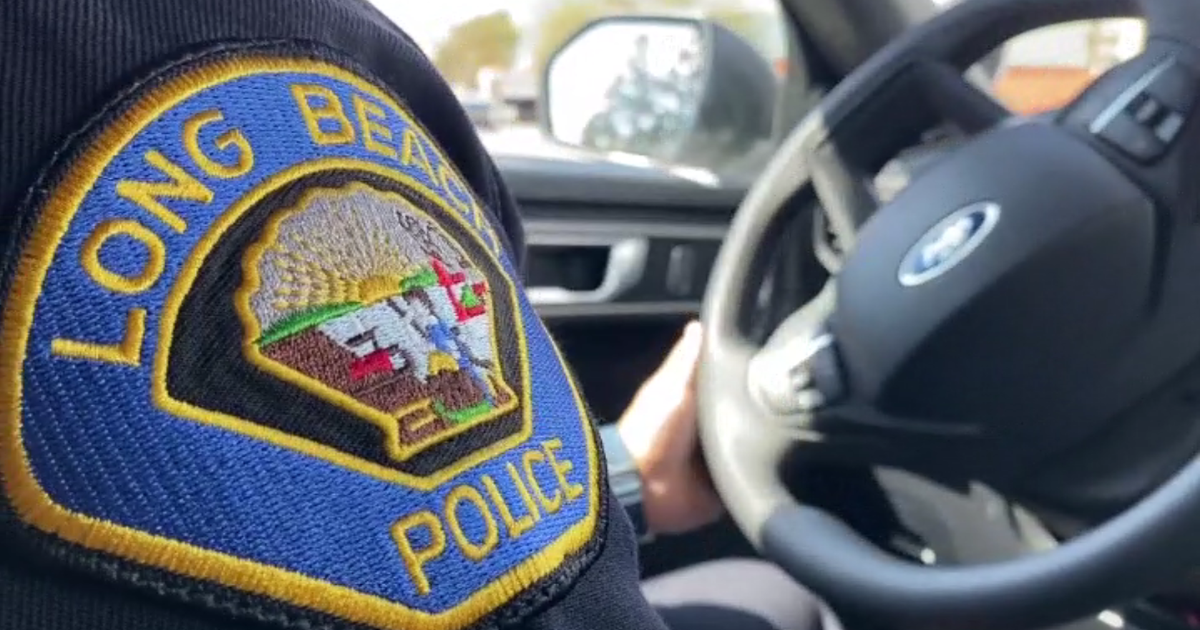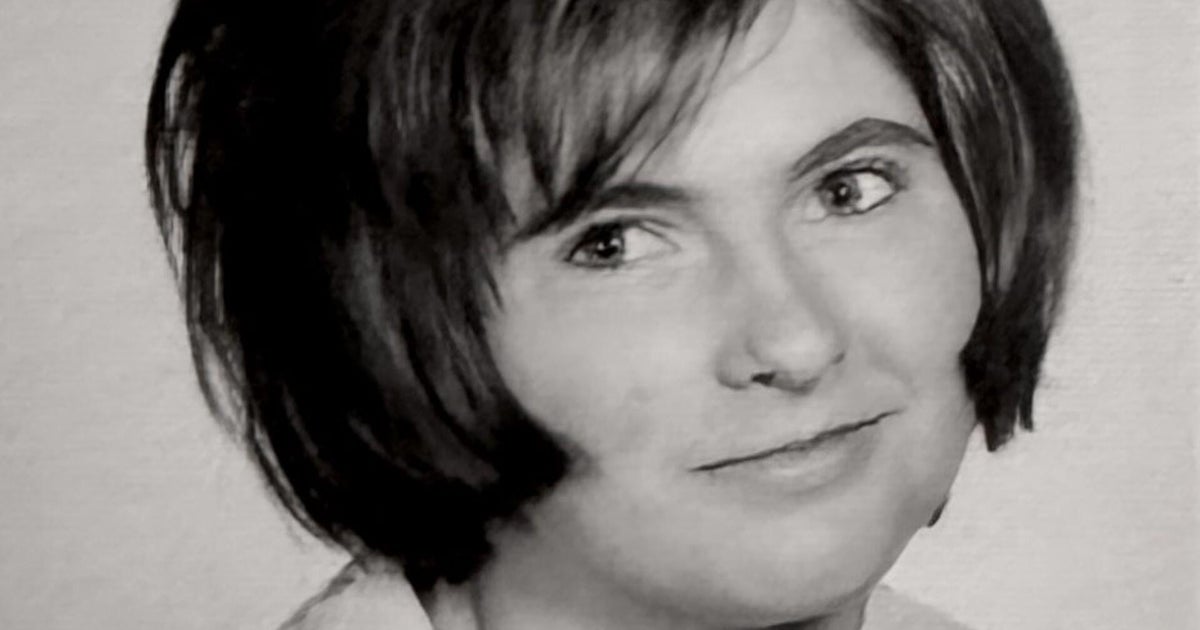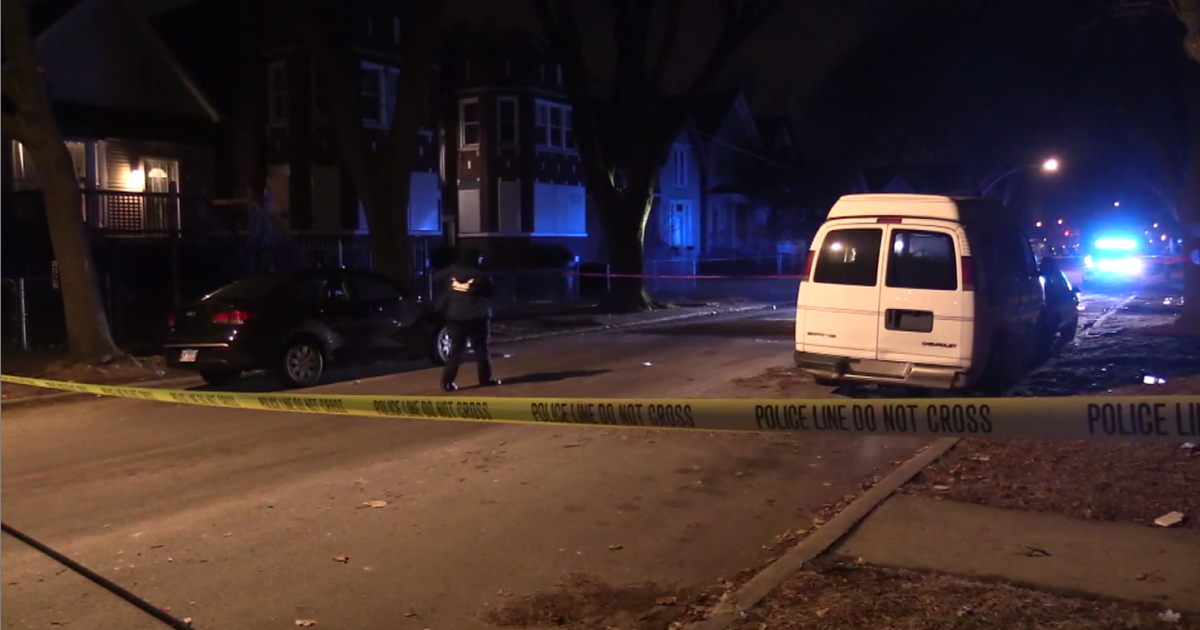"48 Hours" uncovers missing escort Shannan Gilbert's final minutes
Police made an arrest in the Gilgo Beach case on Friday, July 14, 2023. Read the latest from CBS News.
(CBS) OAK BEACH, Long Island -- Since late 2010, 11 bodies -- nearly all young woman, have been found along a stretch of beach on New York's Long Island. So far, there has been no arrest, but since our last "48 Hours" broadcast, there are new developments in the case. And more questions about a curious character who put himself right in the middle of the mystery.
In the hours after midnight on May 1, 2010, Shannan Gilbert, an escort on her way to a job, drove past the place where the bones of the Long Island Serial Killer's victims lay hidden in the brush. She didn't know it then, but the mysterious events of the next few hours would forever link her to four young women - whose bodies were found wrapped in burlap -- and spark one of the largest murder investigations in Long Island history. And so it began.
"My sister was last seen running along the roads ... She felt like she was in fear for her life that night," Sherre Gilbert told "48 Hours" correspondent Erin Moriarty. "She just disappeared into the night."
It would be two days before Sherre learned her sister was missing ... when Shannan's worried boyfriend called to say she hadn't come home.
"Immediately, I started to panic," she said. "I could hear the fear in his voice."
It was the call Sherre and her sister, Sarra, had been dreading ever since learning Shannan, diagnosed with a bipolar disorder and struggling with depression and mood swings, had turned to selling her services online as an escort.
"What would she tell you when you would say you were worried about it?" Moriarty asked Sarra.
"She pretty much thought that, you know, it would never happen to her," she replied.
The Gilberts say they immediately filed a missing persons report, but with no news, they drove 140 miles from their home in upstate New York to Oak Beach, Long Island, to look for Shannan themselves. By then, she had been missing for eight days.
"We went to all the houses around the area to, like, knock on their doors and just say, 'Hey listen, did you see my sister?'" Sherre said. "We gave them flyers. We went everywhere."
They spoke to a dozen witnesses and homeowners in the area trying to piece together a timeline. They learned that Shannan and her driver had left New York City shortly after midnight on May 1, 2010, and headed to a gated community in Oak Beach.
"My sister met the client through Craigslist and went to his house around 2:00 a.m.," Sherre explained. "Her driver dropped her off and she was there for quite a while and then ... for some reason, she started to panic."
Shannan's sister believes something awful happened in that house to terrify her because of a 911 call Shannan made from right inside the client's home. It was 4:51 a.m.
Former Suffolk County Chief of Detectives Dominick Varrone, who has heard the call, is speaking for the first time on network television.
"She's saying, 'There's someone after me; there's someone after me,'" he said. "It's a girl who clearly believes ... she's in harm's way."
"Does she say who she's afraid of," Moriarty asked Chief Varrone.
"She just says 'they're trying to kill me,'" he replied.
Varrone says two male voices are recognizable in the background: Shannan's driver and the man who hired her, Joseph Brewer. As Brewer is heard trying to get her to leave his house, Varrone says, "He either approaches her or touches her and ... you hear her scream out."
But police couldn't respond to the call because Shannan couldn't say where she was.
"The complaint operator's asking, 'Well, where are you?' And she just kind of ignores that 'where are you' question and keeps saying 'someone's after me,'" Varonne explained. "She sounds ... not very coherent, not very rational."
"But wouldn't you sound that way if you were panicked and afraid?" Moriarty asked Varrone.
"You could make that argument," he replied. "It almost seems like she's in some type of psychotic state or in some type of drug-induced stupor."
Still on the 911 call, Shannan fled the house ... running towards the nearby home of Gus Colletti, a retired insurance fraud investigator and resident of Oak Beach for over 30 years.
"It was like 5:00 in the morning," Colletti recalled. "I was in the bathroom shaving. ... All of a sudden, I heard screaming out here and banging on that door. Yelling, 'Help me, help me, help me.'"
He opened the door. "And I said to her ... 'What's the matter?' She wouldn't answer me. She just kept staring at me and going, 'Help me, help me, help me.'"
"This is all on the audiotape," Varrone said. "We hear the conversation between the two of them ... and she's just staring at him and not acting rationally."
"I reached over and grabbed that phone, dialed 911," Colletti continued. "When I said to her, 'I called the police. Sit down in that chair. They're on their way,' She just looked at me and she ran right out the door."
Colletti said it was then that he noticed an Asian man in his 30s driving a black SUV. It was Michael Pak, Shannan's driver.
"I could see a car come and stopping, coming a little bit and stopping," he said.
Asked if he thought Shannan was afraid of the man in the SUV, Colletti
replied, "She was afraid of somebody."
Then, Colletti saw Shannan was hiding underneath the boat in his yard.
"All of a sudden, she took off, out from under the boat ... and he took off after her. And I yelled to him to stop. And he didn't and he followed her around that way," he said.
At that point, Colletti called 911. It was now 5:21 am. Shannan ran towards the home of another Oak Beach resident, Barbara Brennan.
"We know she's alive 'cause she's banging on Mrs. Brennan's door ... and Mrs. Brennan calls 911," said Varrone.
But when police arrived at 5:40 a.m., Shannan Gilbert had vanished. They assumed she had already left the area with her driver, Michael Pak.
"All the responding officers can believe at this point is that whoever was in the SUV picked up this girl and they're gone," said Varrone.
Chief Varrone says the local police responding to Colletti's call knew nothing about Shannan's own 23-minute 911 call. What has never been reported before is that Shannan's call was transferred to the New York State Police when she couldn't tell them where she was. It took nearly a month for police to connect Shannan's desperate call to the missing persons report her family had filed in New Jersey, where Shannan lived.
"If Michael Pak had stayed there and told the officers that she was still missing, is it possible that Shannan Gilbert might still be alive?" Moriarty asked Varrone.
"It's possible," he replied. "He may have looked for her as he was driving out the gate ... but he certainly was nowhere to be found when officers responded and arrived."
Sherre Gilbert says her sister was desperately trying to make a better life for herself.
"My sister had other dreams, you know. She wanted to be a singer, an actress. She was pursuing that. And she was also goin' to school to be a writer," she said.
No one knew then, that seven months later, the search for Shannan would turn up the grisly grave site of the bodies of four other young women who, just like Shannan, had simply disappeared.
In December of 2010, then-Suffolk County Police Commissioner Richard Dormer downplayed it, but there was little doubt about what his department was confronting. Four bodies had been discovered. All were young women in their 20s. All were online escorts.
"I don't want anybody to think that -- we have a Jack the Ripper runnin' around Suffolk County with -- blood drippin' from a knife," Dormer told reporters..
One by one, the bodies were identified, and with each name, came the story of a troubled life cut short.
MELISSA BARTHELEMY: Disappeared July 12, 2009
Lynn Barthelemy's 24-year-old daughter, Melissa, had been missing for a year-and-a-half when the bodies were discovered.
"My fiance and I were actually watching CNN ... they were televising where they found the bodies ... And we just looked at each other and we started cryin,'" Barthelemy recalled. "We had a sinking feeling that it was her."
After graduating from beauty school, Melissa moved from her small hometown near Buffalo to New York City to work as a hairdresser.
"I was terrified," Barthelemy said. "I mean, a big city like that. I'm like that's -- 'they're gonna eat you alive.' But she was of age and all I could say was 'be careful' and call her all the time."
What Lynn Barthelemy didn't know at the time was that Melissa was actually working as an escort. In mid July 2009, after several days with no word from Melissa, her mother panicked.
"Did she get hurt?" Barthelemy wondered. "We pull out the phone book, we get on the internet. We start callin' hospitals."
Barthelemy also contacted the NYPD to file a missing persons report, but she was in for a rude awakening.
"They didn't wanna hear anything," she said. "'She's 24 ... She's not on any psych meds. She's not missing. She's where she wants to be.' And that happened for three days consecutively."
Even the family's attorney, Steven Cohen, couldn't get police to take notice.
"I contacted them," he said. "And they said, 'She's a hooker. She's a prostitute. She was -- she's an escort ... We're not going to assign a detective to this.'"
About a week after Melissa disappeared, her 15-year-old sister, Amanda, got a call from Melissa's phone.
"When Amanda answered the phone, you know, she was so excited," Barthelemy said. "'Oh my God, Melissa's finally calling me.' And then, there's a guy on the other end."
"And this voice is saying, 'Oh, this isn't Melissa,'" Cohen explained.
"...he was soft-spoken and had -- a very controlled and comfortable manner of speech, which made his horrific messages all the more devastating ... he began to toy with her ... And for the very first time, she heard the voice of the killer."
Suffolk County police told "48 Hours" that they believe the caller was, in fact, Melissa's killer.
"I was just hysterical, totally hysterical," said Barthelemy.
The calls didn't stop coming. There were eight in total, including one in which the likely killer spoke to Lynn. He claimed he was with the NYPD and wanted to know if she had filed a missing persons report. But mainly he focused on Melissa's little sister and called to terrify her.
"And the killer said some pretty horrible things to Amanda," Cohen told Moriarty. "Sexually explicit things as to what he had done to Melissa, sexually explicit things as to what he was going to do to Amanda."
After the third call, police asked Verizon to tap Amanda's phone.
Authorities were able to trace some of the calls to a handful of busy locations in midtown Manhattan: near the Port Authority, the Empire State Building and Times Square. The caller always hung up before he could be identified. But the police were learning a lot about him based on his voice.
"I believe that he is between -- his late 20s and his late 30s," Cohen said. "I've been led to believe by Amanda and by the data that I have that he is a white male."
Much has been made about the caller's familiarity with police investigative techniques. He knew what locations would be difficult to trace and how long he could stay on the phone. That sense of confidence may have driven the caller to reach out to Amanda one last time on Aug. 26, 2009, with a chilling message.
"And he said, 'Do you know what I did to your sister?' And she said, 'No.' He said, 'Well, I killed Melissa,'" Cohen said. "And he also left one of the conversations with the threat that he knows where Amanda lives and might come after her."
"All I can say is he's sick. And he's gonna make a mistake. And we're gonna catch him," said Berthelemy.
Asked if he believes this man will probably kill again, Cohen told Moriarty, "Oh, there's no question ... he is getting better and better at it. He is very controlled, very calculating in what he does. And he's on a mission."
With each burlap covered victim found on Gilgo Beach, the police learned more about the serial killer: his habits, his M.O., and his uncanny ability to avoid detection.
AMBER COSTELLO: Disappeared Sept. 2, 2010
"She used to say that she was better off dead..." said Dave Schaller, Amber Costello's roommate and friend. In December 2010, detectives showed up at his door. "I was like, 'You guys found Amber... You found her.'"
By then, Amber had been missing from their home on Long Island for three months. She lived just 10 miles from the killer's dumping ground.
Schaller says the last time he saw Amber she was on her way to meet a client who had responded to her online ad.
"I walked out the front door with her," Schaller recalled. "I was like, 'Be safe.' She gave me a hug and a kiss ... and she left."
But when Amber didn't call or come home, says Schaller, no one in her family even looked for her.
"There's something so sad that Amber lived 27 years, disappears, and nobody reports her missing," remarked Moriarty.
"I think she lived her life as if like she didn't even care about herself..." said Schaller.
Schaller says Amber hated the person she'd become: a drug addict who turned tricks to support her habit.
"She knew what she was doing was just like degrading, just despicable," he said. "She absolutely hated it..."
"It strikes me right away David ... predators prey on the weak," noted Moriarty.
"Exactly," Schaller agreed, "like a lion smells a dying gazelle."
Schaller says the client enticed Amber with the promise of big money.
"If she was going to stay the night ... she would have walked away with $1,500," he said.
"A lot of money for her," Moriarty noted.
"Yeah, that's a lot of money for any of these girls," Schaller replied.
That amount -- $1,500 -- was almost six times Amber's going rate. According to Schaller, the man was persistent, repeatedly calling and cajoling Amber that day.
"It was probably around three or four times ... but she was on the phone with him for a while each time," he said.
Schaller says the caller was so persuasive, Amber -- an experienced escort -- walked out the door without her purse or even a cell phone.
"For him to have gotten her to leave so recklessly ... I think this guy got into her head somehow."
Somehow he convinced her to meet him alone -- an unusual move for Amber, who normally required clients to come to her.
"Do you think the person she went out with that night is the same person who killed her?" Moriarty asked Schaller.
"There's no doubt in my mind..." he replied. "He wanted to kill her."
MEGAN WATERMAN: Disappeared June 6, 2010
Megan Waterman was last seen leaving a Holiday Inn Express on Long Island in June 2010.
Significantly, this is the same Holiday Inn where a client asked Amber Costello to meet him just few weeks before her death. She refused, but Megan, who usually had someone accompany her on calls, let down her guard and went out into the night alone.
Megan was just 22 when she was murdered, leaving behind a 4-year-old daughter.
"The world lost an awesome girl, a wonderful, wonderful mom, a friend..." said Megan's mother, Lorraine Ela, who has a message for the killer:
"I want to know why you took my daughter ... Why would you hurt a human being? You need to turn yourself in because you will be caught ... and you will be caught soon," said Ela.
MAUREEN BRAINARD-BARNES: Disappeared July 9, 2007
"I believe my sister needs a voice ... needs her pride back ... needs the respect she had before this all happened," said Melissa Cann. She wants people to know that her sister, Maureen Brainard-Barnes, may have worked as an escort, but she was much more than that.
"She was a human being ... she was a mother ... she was a loved sister ... she was everything to us," Cann said. "If you came up and asked her for her last penny in her pocket, she would give it to you..."
In July 2007, Maureen left her home in Norwich, Conn., and boarded a train to New York City. She went to set up appointments with men on Craigslist. At the time, Maureen was a desperate, single mother of two.
"She was getting evicted from her house. ... She needed to get some money. It was her last resort... These are all the jobs she called and applied for ... call center, data entry ... and the list goes on and on," Cann said, showing off a list.
"She didn't turn to Craigslist [because] she wanted to ... she turned to Craigslist because she felt like there was no way out. No one would give her a job," said Cann.
Maureen checked into a Super 8 hotel in Manhattan, and like the other young women, the 25-year-old seemed to vanish in the night.
"When I finally told myself Maureen was actually missing, that she wasn't coming back, I couldn't breathe. It was hard to breathe," said Cann.
Fearing the worst, Maureen's family went to the Norwich Police Department, submitted her name to the missing persons database, and told police she was an online escort.
"We said that Maureen went to New York and she never came back. The cop basically told us, 'Maybe your sister just ran away. Maybe she doesn't care about her kids...'" Cann said, her eyes welling with tears.
Melissa Cann says no one at the local police department took her fears seriously and the family went to look for Maureen themselves.
"My husband and my brother got on their motorcycles and actually took Maureen's picture with them and drove down to Manhattan ... walked around the whole area asking people if they'd ever seen her," she recalled. "No one saw her, no one knew her ... My brother came back and was like, 'It's a different world out there. No one wants to know you. No one cares.'"
On Dec. 13, 2010, Maureen's body was found alongside the others. She was the first woman to disappear in 2007. Melissa Cann simply wishes police had worked harder to find Maureen.
"I feel like they failed me and they failed my sister. They failed these other women that were found with my sister ... I feel like if the right things were done maybe these girls would still be alive to this day," she said. "We could've saved those other girls."
With Shannan Gilbert's disappearance and the discovery of four other bodies, all escorts, attention focused on a profession that has always operated in the shadows.
"The story of these women ... is the story about a part of America ... where people have few options and where some people make desperate or risky decisions," said journalist Bob Kolker, who has written a new book about the Long Island cases, called "Lost Girls: An Unsolved American Mystery." He says the internet has made prostitution more accessible, but also more dangerous.
Read an excerpt of "Lost Girls"
Kolker: Who let down the lost girls?
"Suddenly, you no longer had to walk down the street; you could just work out of your home," he said. "But ... you're as vulnerable as ever when you're working alone, particularly when you just meet your client that night."
"It makes it easier for a killer who wants to work in the shadows," Moriarty noted.
"It's easy for a killer to go shopping," said Kolker.
And this killer may have been shopping for victims for years.
In March of 2011 -- three months after finding the bodies of Melissa, Amber, Megan and Maureen -- police start finding more bodies and more body parts along a once pristine beach playground; six new sets of human remains in all.
"The area in and around Gilgo Beach has been used to discard human remains for some period of time," a police officer said at a press conference.
Police believe the latest victims were also linked to the sex trade, but only one has ever been identified:
Victim No. 5: Jessica Taylor, an escort missing since 2003; dismembered
Victim No. 6: Jane Doe; dismembered.
Victim No. 7: A baby girl; possibly Jane Doe's
Victim No. 8: An Asian man dressed in women's clothes
Victims 9 and 10: A female skull and a bag of female bones
Ten bodies, eight suffocated or strangled, and none of them Shannan Gilbert, the young woman whose disappearance launched the investigation. At this point, she had been missing for 10 months. Her mother, Mari, and sister, Sherre, were desperately trying to hold onto hope.
"I just did not want to believe that she wasn't ever gonna come home," said Mari.
"I knew that it was a possibility but I really just wanted to keep hope," said Sherre.
The search for Shannan led police back to the last place she was seen -- the gated community of Oak Beach, just 3 miles from the dumping ground and to three men: The man who hired her, the man who drove her, and a doctor who put himself in the middle of the investigation.
Their stories are bizarre and confusing, starting with Joseph Brewer's - the john.
Although Brewer refused to go on camera, he admitted to "48 Hours" that he solicited Shannan online, but, he said, not for sex. The Gilberts' attorney, John Ray, finds that hard to believe.
"So why did he pick, you know, a sex worker if he didn't want sex?" Ray asked.
Brewer claims he doesn't know what set Shannan off or why she made that call to 911. He says her fears were imagined. Attorney Ray says they were real.
"When she made that call, do you believe she thought she was -- her life was in danger?" Moriarty asked.
"No question she thought her life was in danger," replied Ray.
Brewer insists he never harmed Shannan. He says he just wanted her out of his house and even brought the driver in to get her to leave. He says the last time he saw Shannan, she was running out of his house toward his neighbor's.
That neighbor, Gus Colletti, is the one who tried to help Shannan and noticed that black SUV following her.
"I could see a car coming down the road very slowly ... would stop and then go a little bit. Stop, go a little bit," said Colletti
In that car was Michael Pak, Shannan's driver - the second man police wanted to talk to.
"I ran up to his car and I said to him, 'Where do you think you're going?'" said Colletti.
Pak told Colletti he was looking for Shannan.
"I said, 'Well, I called the police ... they are on their way to bring her back," Colletti said. "He said, 'You shouldn't have done that.' I said, 'Well, I did.'"
He wouldn't go on camera, but in a text message, Pak says that he "never touched her" and maintains that he had nothing to do with Shannan's disappearance. Police say both Pak and Joseph Brewer passed polygraphs, and are not suspects.
And then there's the third man.
"There's nothing I can add that the police don't already know," said Dr. C. Peter Hackett, an Oak Beach resident and retired emergency services doctor who curiously inserted himself in the middle of the mystery - by calling Shannan's mother on May 3, 2010, two days after Shannan went missing.
"Peter Hackett told me that Shannan was at his house, that he ran a halfway house for people who wanted to get off the street and that Shannan was there," said Mari Gilbert.
Mari says during that phone call on May 3, Dr. Hackett told her that Shannan had left his house with her driver and that he was worried about her. But when Shannan's sisters went out to Oak Beach, they got a different story.
"He denied calling my mother," said Sherre Gilbert.
"Had he seen Shannan?" Erin Moriarty asked.
"He said he never saw Shannan before," she replied.
"What did you think?" Moriarty asked.
"I thought that he was a liar and I still think he's a liar," Sherre said.
"You didn't think your mom could be mistaken?"
"I was there when my mother received the phone call, so there's no way."
Dr. Hackett later admitted in letters to "48 Hours" that he had called Shannan's mother, but he said it was later in the week and he did so at the request of friends who were searching for Shannan to be "supportive." But he went on to say that "at no time ... did I suggest I had ever met her or render medical care of any sort to her."
Dr. Hackett has steadfastly denied ever seeing Shannan to the press.
And when Mari Gilbert confronted him with a friend's camera rolling, he denied it again:
Mari Gilbert [Cell phone video]: Firsthand what happened? Did you ever see her? What did you hear?
Dr. Hackett: I never saw her, I never met her. ... All this stuff about a rehab or something I don't have a rehab, I don't do rehab.
Mari Gilbert: Why would you say that to me?
Dr. Hackett: I didn't.
"Could Shannan Gilbert's mother invent this even if she wanted to? It doesn't seem plausible," said Kolker.
"48 Hours" has since recently obtained phone records from Shannon's mother that confirm Hackett actually did make a call to Mari Gilbert exactly when she said he did on May 3.
"You called Mari on your wife's cell phone on the third on that Monday when Mari said you called," Moriarty told Hackett.
"Yeah, I'm sure I did. When you give ... look let me not get into it," he said.
Just weeks ago, "48 Hours" went to Dr. Hackett's house to try to get answers.
"So why would you call her mother? That's what was odd. So you inserted yourself. And then you keep changing your story," said Moriarty.
"... because I couldn't remember my story. Seriously, a person gets a lot of phone calls," he said.
Former Chief of Detectives Dominick Varrone says Dr. Hackett is not a suspect in Shannan's death. While the calls he made to Shannan's family may be strange, they're not out of character.
"He's an individual who likes to get involved," Varrone said of Dr. Hackett. "Some call him a storyteller and an exaggerator. We certainly believe that he may have called to offer his assistance."
But Shannan's mother believes Dr. Hackett knows more than he's saying.
"If he's lying about something so simple about calling me," Mari Gilbert said, "then what else is he lying about?"
In December 2011, a year-and-a-half after Shannan Gilbert vanished, police finally found the first sign of the missing 23-year-old in the marsh by Oak Beach not far from where she was last seen.
"Today they found a pair of jeans ... a pair of shoes ... the pocketbook with identification in the pocketbook belonging to Shannan Gilbert," then-Suffolk County Police Commissioner Richard Dormer told reporters.
A week later, a quarter-of-a-mile away from her belongings, they found Shannan's skeletal remains nearly intact, face down.
"I still don't want to believe it. I don't," said Shannan's mother, Mari Gilbert.
"I was really sad," Sherre Gilbert said. "I feel like now that they found her body that is kinda pretty much it for the investigation.
Even though the cops assured us that they are going to continue."
How and why did Shannan die? The medical examiner couldn't determine cause of death, but investigators don't think she's the 11th victim of the Long Island Serial Killer. Former Chief of Detectives Dominick Varrone believes Shannan actually died by accident -- after running into the thick marsh and getting lost.
"But Chief, she was only 23 years of age. What would kill a 23-year-old woman? What would she die of if ... she didn't drown or wasn't killed?" Moriarty asked.
"Shock," Varrone replied. "Certainly she could've succumbed to the elements after a while ... total fatigue and exhaustion."
But then how did her clothing end up so far from her body?
"She's disoriented; she's in a frenzy," Varrona explained. "You have to understand the manner in which these items were found ... very consistent with someone losing these items as they're running."
"But how would she lose her jeans as she's running?" Moriarty asked.
"Well, you're in muck; they're soaking wet; they're soaked with mud ... they're weighing you down ... she's running in a panicked state and the muck and the mud and they just come off her as she continues to run," Varrone explained.
The official explanation doesn't satisfy Shannan's family.
"I believe Shannan was murdered," said Sherre.
"You have no question about that?" Moriarty asked?
"No," she exclaimed. "How could you have her items in one spot and then her body all the way in another spot close to the highway? It doesn't make any sense."
"It absolutely makes no sense that she's found where she is, except that someone else put her there or killed her there," said Gilbert family attorney John Ray.
Last year, Ray and two colleagues put the police theory to the test.
"We want to see whether Shannan really could've taken the trip police believe she took," Ray said before heading into the marsh.
"If she had abandoned her shoes and she was walking barefoot through this, it would seem almost impossible for her without cutting up her feet very badly on the broken reeds," he explained.
"How could this tiny 23-year-old get that far into it - into there?" Moriarty asked Varrone.
"Understand that she's not running through bramble, she's running through -"
"But marsh and reeds ... I've seen it, its really overgrown," Moriarty noted. "And it was too overgrown to bring in dogs and to search!"
"No. It's like running through a corn field or a wheat field you just push ... push it outta your way," said Varrone.
Shannan's family members believe the police should have done more to investigate the man they believe was the last person to see Shannan alive: Dr. Peter Hackett. Chief Varrone insists police didn't know about that call until months later.
"So, when Mary says that Dr. Hackett called on May 3 and said that he'd seen Shannan and that he was running a home for wayward girls, do you believe that, do you believe what she's saying?" Moriarty asked Verrone.
"I don't believe he said that. And I would be amazed as to why wasn't that brought to our attention? Why weren't they screaming that and clamoring that?" he replied.
"No one in the family said that Dr. Hackett called saying that he had seen Shannan?" Moriarty asked.
"Absolutely not. That was never reported to us," said Verrone.
But "48 Hours" did some more digging and found that Mari Gilbert did in fact report that strange phone call from Dr. Hackett just days after her daughter disappeared.
It's all in the missing person's report. The problem is, instead of filing it in Suffolk County, N.Y., where her daughter was last seen, Mari was required to file it where her daughter lived in New Jersey. Somewhere along the line, somebody dropped the ball.
"When I tried to tell my story to the police and to the media no one believed me," said Mari.
Dr. Hackett: [Cell phone video]: If you thought I had information like that why didn't you tell the police a year ago?
Mari Gilbert: We did.
Unidentified woman: We did. They don't want to hear anything.
Convinced the Suffolk police weren't going to investigate Shannan's death, attorney John Ray took matters into his own hands. Last
November, he filed a wrongful death suit against Dr Hackett.
"We believe that Dr. C. Peter Hackett's actions led to Shannan Gilbert's death," said Ray.
The suit claims Dr. Hackett improperly treated Shannan Gilbert and points to what he allegedly said in the phone call to Shannan's mother as proof.
"... that Shannan was distressed. That he had treated Shannan and had medicated her," said Ray.
In fact, Dr. Hackett was known to provide medical treatment out of his home. Two neighbors signed affidavits -- one stating the doctor had given him "a prescription injectable steroid" and another claiming that Hackett "provided ... prescriptions for Oak Beach residents."
Dr. Hackett admits he has treated friends and neighbors, but denies he ever saw or treated Shannan.
"Is it possible that he knows more about what happened to Shannan Gilbert?" Moriarty asked Varrone.
"It's possible. Am I personally troubled by it? No," Varrone replied.
"I'm satisfied ... in my belief and understanding of what occurred."
Varrone says that while Dr. Hackett may be a busybody - "He exaggerates, that's how some people have described him" -- he is not a suspect in Shannan Gilbert's death or in any other.
Journalist and author Robert Kolker now wonders if solving the mystery has ever been a police priority.
"In this police force, not unlike a lot of other police forces around the country, there's this culture of minimization and denial when it comes to women who are escorts," he said.
"I've heard that the police failed these girls. I don't think that's the case," said Chief Varrone.
Varrone says that the investigation into Shannan's death remains open and is confident that the days of the elusive serial killer haunting the beaches of Long Island are numbered.
"Do you believe that this killer or killers will eventually be caught?" Moriarty asked Varrone.
"I do," he replied. "Perhaps someone knows something. And maybe that little something that they know will lead to the solving of this case."
Suffolk County Crime Stoppers is offering a reward of up to $25,000 for information leading to an arrest in the Long Island serial killer case.
Anyone with information is urged to call 1-800-220-TIPS (8477). Tips can also be submitted online.
Produced by Clare Friedland and Liza Finley






